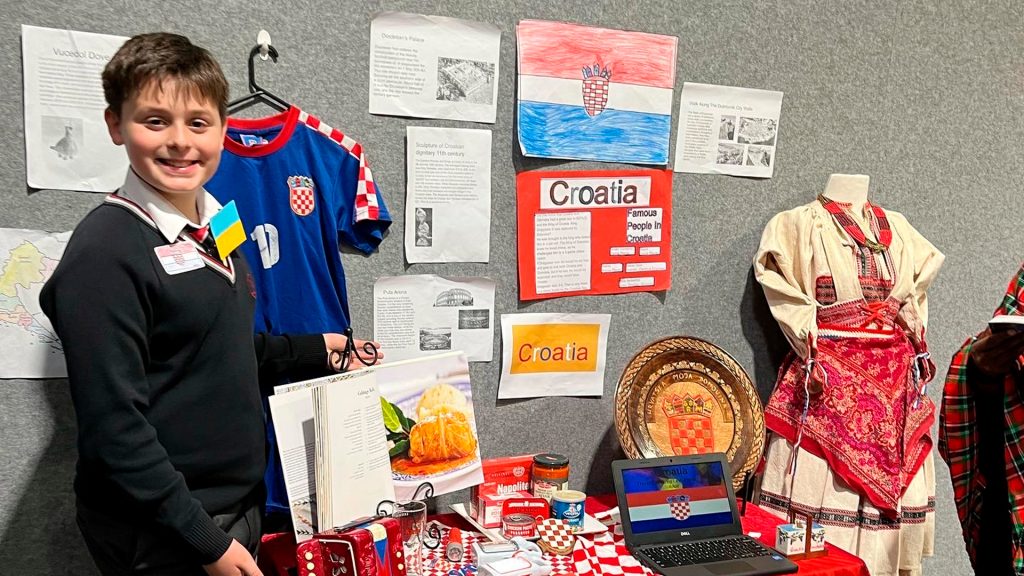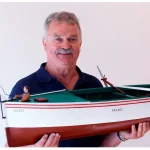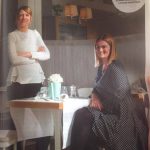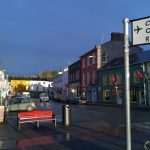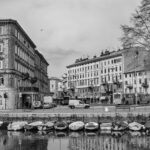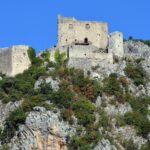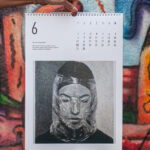Arkie Kokoris, an 11-year-old boy from Melbourne, Australia, won first place in a Travel Expo school project, which consisted of presenting information about a country, where he and his 2 colleagues chose Croatia due to his families ties. They were tasked with presenting a Travel Expo stand, encouraging people to visit their chosen country, and were asked to provide information on the natural attractions, climate, tourist destinations, cuisine, culture, history, wildlife, and more.
Arkie’s presentation included local products, flags, shirts, traditional costumes, and more. (Photo: Irena Kokoris)
Arkie attends a private Christian school and he’s currently in year six. He included some fact sheets about Croatia and a hand-drawn map which they placed on the wall and a slideshow presentation on interesting facts and the history and culture of Croatia. They included historical buildings and landmarks, nature parks, food, and animals. For the visual display, they included the flag, various souvenirs from Croatia, traditional food items, some sporting memorabilia including a soccer jersey from Dinamo, an authentic Croatian costume from Zagreb, a cookbook, and another book on famous landmarks and buildings in Croatia. One of the students has a 3D printer and made lithographs of famous buildings which would be placed in front of a torch to show the image.
A smaller Arkie with a Croatian football shirt. (Photo: Irena Kokoris)
His presentation obtained first place after a voting process, and a humble first prize of a certificate and a round of applause followed. His fellow classmates had to vote on their favourite display and Croatia won by a landslide.
Total Croatia News interviewed his mother, Irena Kokoris, who, in addition to being great support of her son in the process of designing and executing the project, proudly shared the achievement on social media. Irena’s heritage story is, perhaps, one of the most interesting and touching I’ve read, and I’m really glad that you can learn from it through her own words.
My parents are from the region of Zumberak, Karlovac. They grew up on farms, tending to animals and the land as well as attending school and doing their homework by candlelight. They left in 1971 for Australia as a young and newly married couple, hoping to start a new life together with opportunities for their future children. Upon arrival, they were met by only one relative.
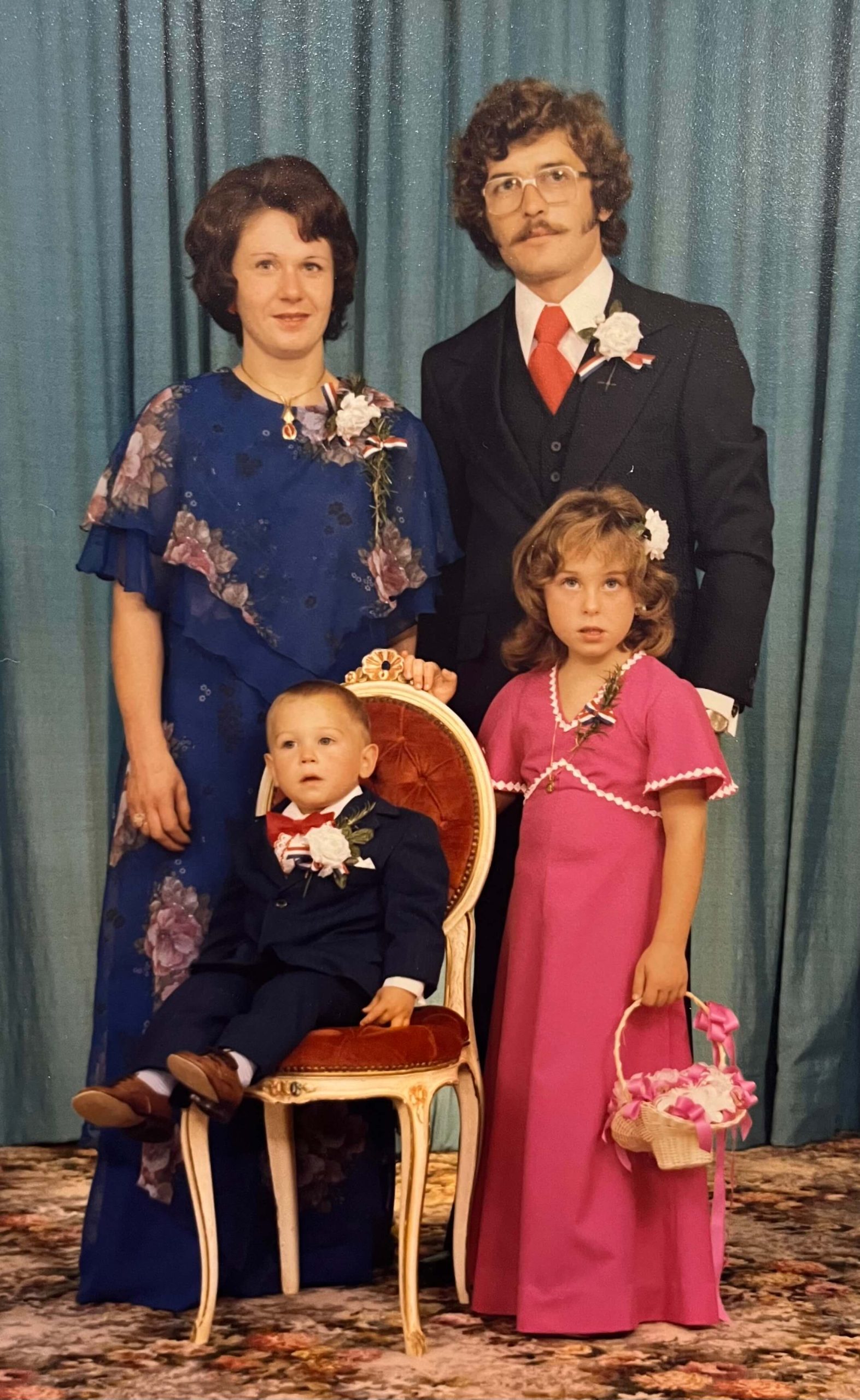
Irena with her father Zdenko Rados, her mother Katica Rados, and her younger brother, Marko. (Family album)
They spent some time in an immigration camp before finding rental accommodation and finding work. They both worked full-time jobs their whole working lives, as well as raising 2 children. They have 6 grandchildren. My father passed away suddenly last year at the age of 69 leaving a large hole in our family. My mother made sure to include the grb on his gravestone, he was a very proud Croat.
Irena’s father, Zdenko. (Family album)
What kind of Croatian traditions and customs did you have at home when growing up? Were there Croatian recipes and food as well?
We always celebrated the Catholic holidays with the family, having a pig cooked on the spit, lots of sides, and lots of beer and wine. My parents had many family and friends of Croatian heritage and we always had some kind of gathering to attend on the weekends. Dinner dances, weddings, holy communion or confirmation, birthdays, etc. Mum taught me how to make sarma, gulas, cevapi, kiseli kupus, as well as many other traditional foods. There would be sunka, slanina, kobasice, wine, and sometimes rakija as the seasons allowed.
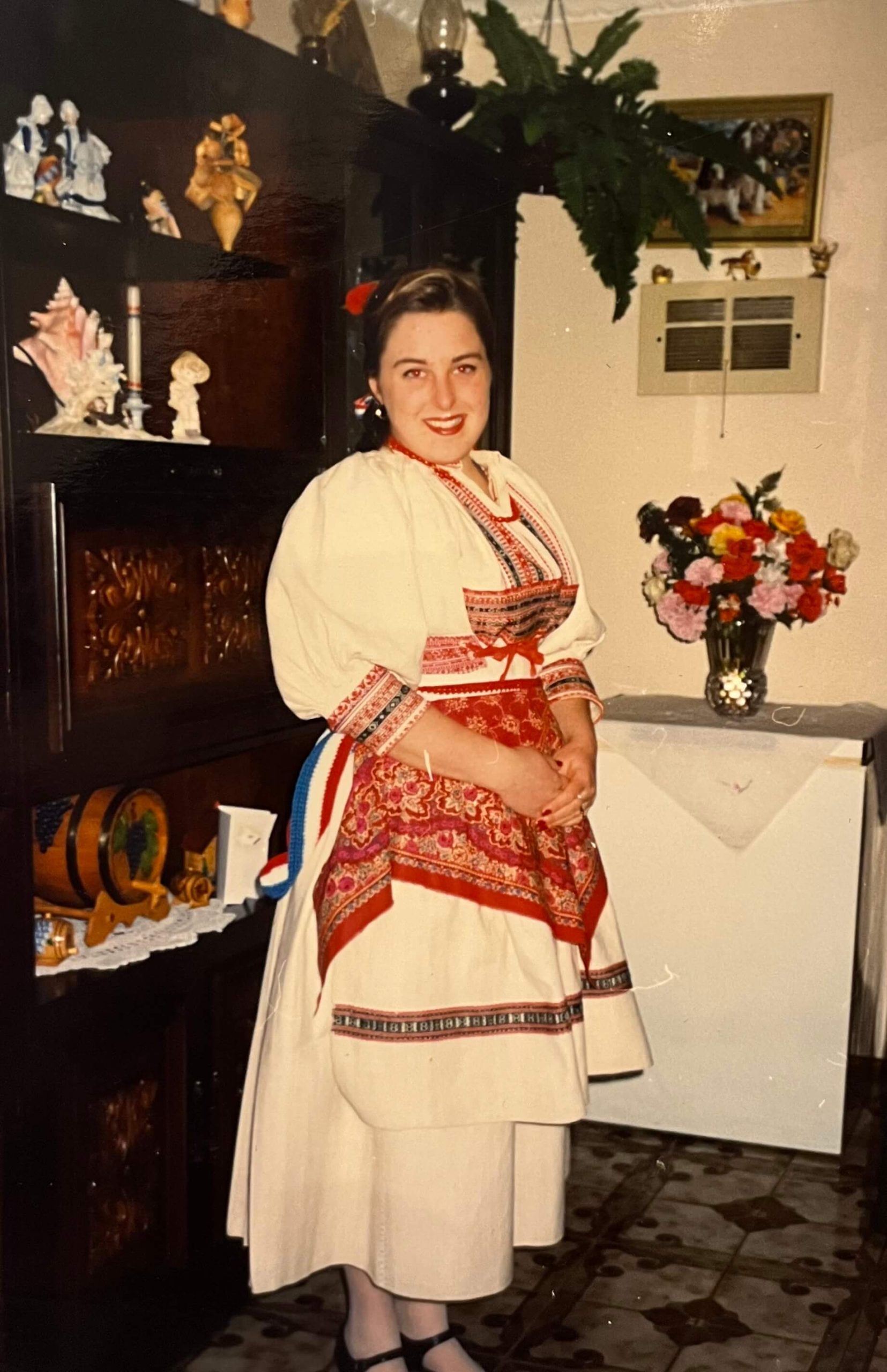
Irena with a Croatian traditional costume. (Family album)
Was there a Croatian community where you grew up? Have you been a part of it? How?
We’re a part of the Hrvatsko Vinarsko Drustvo, Mladi Hrvati Folklore, the Croatian Golf Club, Croatian Saturday School, our church was Sv Nikola Tavelic, and there were many dinner dances organised by the church as well as New Years Eve parties. I danced for many years, into my early 20s, my brother also attended for a few years. Being part of the dancing group, attending many events was some of the happiest memories of my teenage years. One year (around 1990), a large group of Croatian singers and the President of Croatia Stipe Mesic visited the Melbourne Knights soccer club and we sang the Australian National Anthem and danced for them.
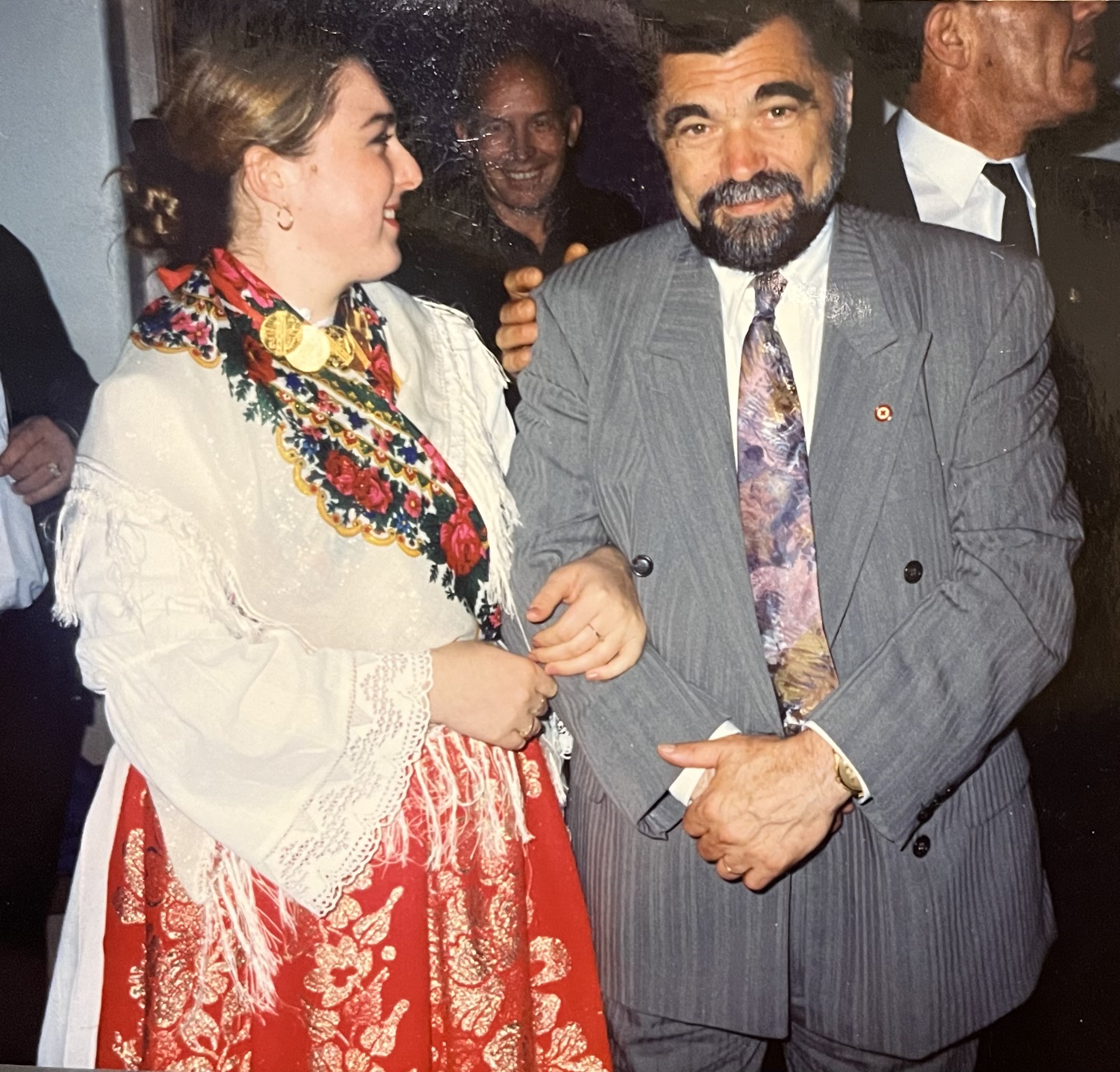
Irena with former Croatian president, Stjepan Mesic. (Family album)
Have you visited Croatia? What was your impression?
Visited in 1985 as a teenager, spent most of the time in the village, but travelled to Slovenia, Rijeka, Zagreb and Karlovac. Visited Plitvice and a few other locations. Spent a lot of time in the forest and on the farm. Picked cherries from the fields and mushrooms from the forest. My parents went back to Croatia in 2014 and took my oldest son Arthur with them for 6 weeks.
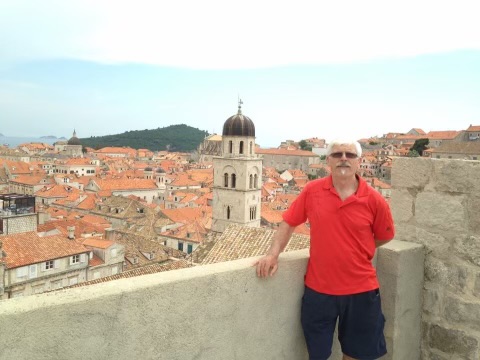
Irena’s father Zdenko in 2014 trip to Dubrovnik. (Family album)
They travelled more extensively that time and saw more sights, including Dubrovnik and Split and my son really enjoyed his time there. My dream is to return for a visit and bring my family to see the country of their mother’s heritage. Croatia is such a beautiful country and I feel strong ties. We were planning to go in 2021, but the pandemic changed our plans! My children are old enough now to travel and it is definitely on my bucket list!
Irena’s older son, Arthur, went to visit Croatia with his grandparents. (Family album)
What makes your connection to Croatia so strong and special? What is it that you like the most about your Croatian heritage?
Growing up hearing my parents talk about their homeland with such fondness (apart from the hardship). They were mindful to pass on their love and pride in their country to us. We attended Croatian school on Saturdays for many years, learning history, geography and language. I remember our teacher didn’t know any English, so we had to speak Croatian the whole time! Having visited there in 1985 as a young girl, I have such fond memories and loved the land and the carefree attitude of its people.
The Rados family during the 50th year of marriage celebration between Zdenko and Katica. (Family album)
I love that I am of Croatian heritage, I am proud of it and proud that I had the opportunity to participate in the Australian Croatian community for many years in my life. After I married, I became less involved and moved into becoming a mother and wife – of which I am also very proud.
In which ways do you try to teach your children to embrace their Croatian heritage?
I always remind them that despite their surname – they are half Croatian! They have all shown an interest at some stage in learning the language and have picked up a little over the years. They love all the Croatian cuisine – especially the kolace! I involve them in learning some recipes such as punjene paprike, cevapi and raznjici. We have attended a few dinner dances over the years and I think my older two may attend Croktoberfest this year!
Irena’s children are of both Greek and Croatian descent. (Family album)
What’s your favorite thing about Croatia?
My favourite thing has got to be the culture around folklore dancing! I think it is beautiful, elegant and regal. The costumes are divine and the music is amazing. I miss dancing so much but am so glad I was a part of it for so long.
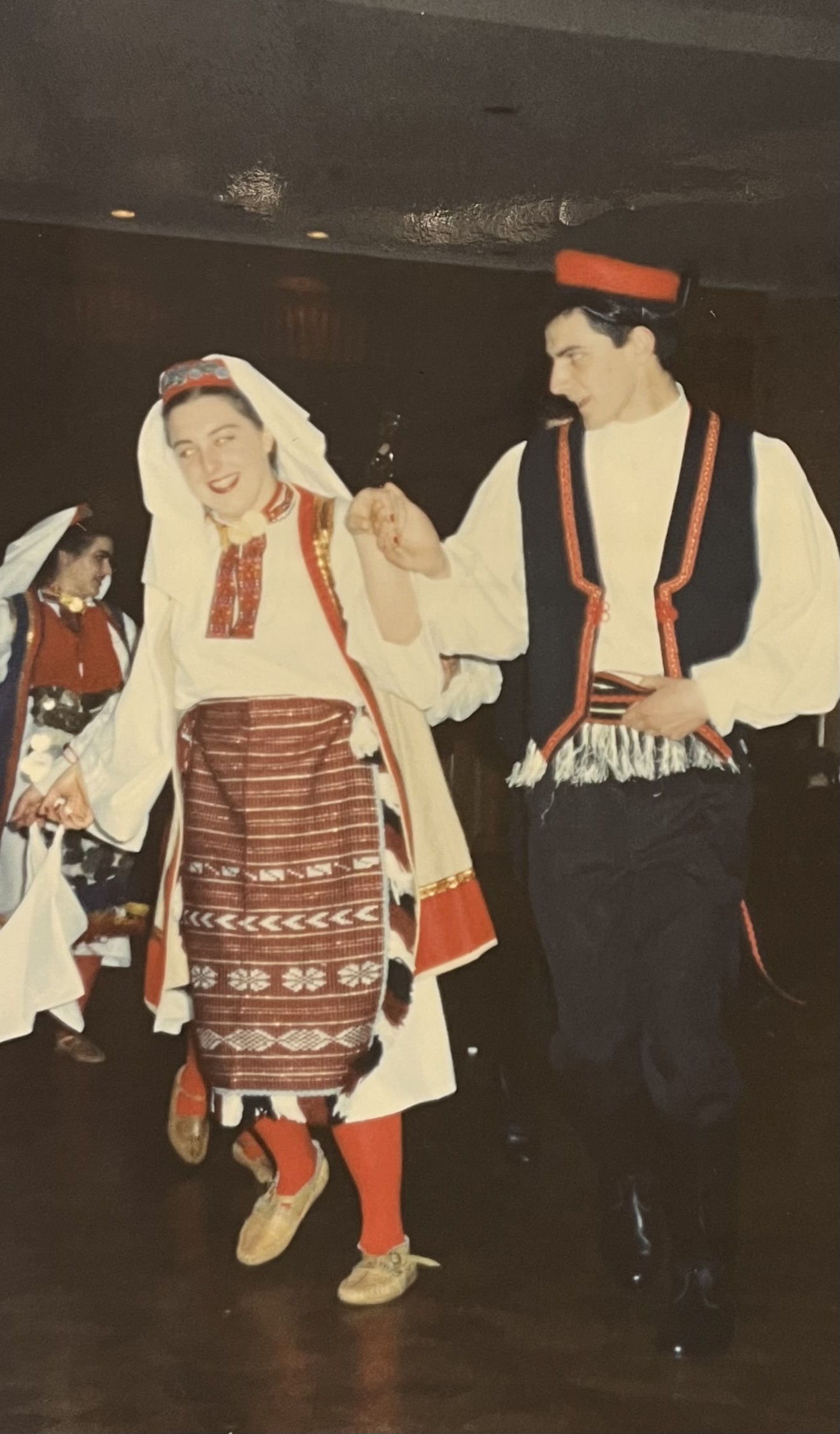
Irena dancing with a friend. (Family album)
Thank you Irena for sharing your story with us!
For more news about the Croatian diaspora, visit our dedicated section.

